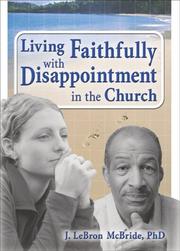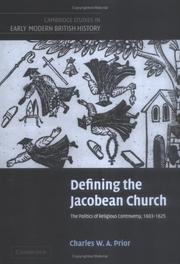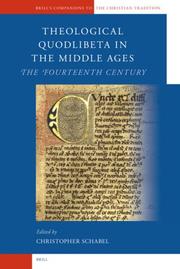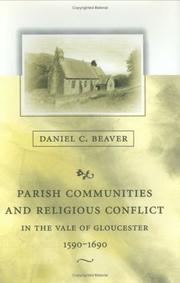| Listing 1 - 10 of 23 | << page >> |
Sort by
|
Book
ISBN: 1842278592 9781842278598 1842277480 9781842277485 9781842277485 Year: 2014 Publisher: Milton Keynes, England
Abstract | Keywords | Export | Availability | Bookmark
 Loading...
Loading...Choose an application
- Reference Manager
- EndNote
- RefWorks (Direct export to RefWorks)
Book
ISBN: 1283160889 9786613160881 9004215085 9789004215085 9789004188679 9004188673 Year: 2010 Publisher: Leiden Boston Brill
Abstract | Keywords | Export | Availability | Bookmark
 Loading...
Loading...Choose an application
- Reference Manager
- EndNote
- RefWorks (Direct export to RefWorks)
Jacobus Arminius (1559-1609) composed 61 public disputations during his brief tenure as professor of theology at Leiden University, 36 of which have never before been collected and published, and have been neglected by scholars for four centuries. This critical edition supplements the works of Arminius by presenting these texts in the original Latin, complete with notes and summaries in English. The texts are preceded by a helpful introduction to the genre of theological disputations. In addition, the question of disputation authorship is treated exhaustively for the first time, demonstrating Arminius's primary authorship of these documents.
Book
ISBN: 1281939935 9786611939939 9047431685 Year: 2007 Publisher: Leiden : Brill,
Abstract | Keywords | Export | Availability | Bookmark
 Loading...
Loading...Choose an application
- Reference Manager
- EndNote
- RefWorks (Direct export to RefWorks)
This is the second of two volumes on theological quodlibeta, records of special disputations held before Christmas and Easter circa 1230-1330, mostly at the University of Paris, in which audience members asked the great masters of theology the questions for debate, questions de quolibet, “about anything.” The variety of the material and the authors’ stature make the genre uniquely fascinating. In Volume II, chapters by acknowledged experts cover the quodlibeta of John Duns Scotus, Peter Auriol, John of Pouilly, Peter of Auvergne, and Thomas Wylton; examine the pertinent writings of the religious orders, including the monks, canons regular, and mendicants; revise our understanding of important manuscripts containing quodlibeta; offer critical editions of significant texts; and demonstrate how these writings are crucial for our knowledge of the history of topics in metaphysics and natural philosophy. For all those interested in medieval studies, especially intellectual history.
Theology --- Church history --- Religious disputations --- History

ISBN: 0789026228 1315044153 1135427984 9781135427986 129986743X 9781299867437 9781315044156 078902621X 9780789026217 9780789026224 9781135428051 9781135428129 1135428050 Year: 2005 Publisher: Binghamton, NY
Abstract | Keywords | Export | Availability | Bookmark
 Loading...
Loading...Choose an application
- Reference Manager
- EndNote
- RefWorks (Direct export to RefWorks)
A practical approach to address spiritually crippling disappointment with the church!
Feeling disappointment with your church can be spiritually devastating. Living Faithfully with Disappointment in the Church gives you a theological and family therapy approach to disillusionment in the church that is practical and realistic. The author, an ordained minister and a licensed family therapist, discusses with sensitivity and hope the problems and the ways to resolve issues of spiritual disappointment.
Living Faithfully with Disappointment in the Church uses a theological bas
Church controversies. --- Church conflicts --- Church disputes --- Church fights --- Conflicts, Church --- Controversies, Church --- Fights, Church --- Church management --- Religious disputations
Book
ISBN: 3631757379 3631757360 3631757387 Year: 2018 Publisher: New York, NY : Peter Lang,
Abstract | Keywords | Export | Availability | Bookmark
 Loading...
Loading...Choose an application
- Reference Manager
- EndNote
- RefWorks (Direct export to RefWorks)
This book deals with the 4th-century Trinitarian controversy, which had a profound impact on negative theology. Eunomius claimed that we can know both the substance (ousia) and activities (energeiai) of God, whereas Cappadocians demonstrated the incomprehensibility of God's essence, and the possibility of knowing his external activities.
Trinity --- Church controversies. --- God (Christianity) --- Church history --- History of doctrines --- Knowableness --- Christianity --- Church conflicts --- Church disputes --- Church fights --- Conflicts, Church --- Controversies, Church --- Fights, Church --- Church management --- Religious disputations

ISBN: 0521848768 9780521848763 9780511495991 9781107406889 0511126115 9780511126116 0511125623 9780511125621 0511125259 9780511125256 0511495994 1280202939 9781280202933 1107153107 9781107153103 0511199538 9780511199530 0511300182 9780511300189 1107406889 Year: 2005 Publisher: Cambridge, UK New York Cambridge University Press
Abstract | Keywords | Export | Availability | Bookmark
 Loading...
Loading...Choose an application
- Reference Manager
- EndNote
- RefWorks (Direct export to RefWorks)
This 2005 book proposes a model for understanding religious debates in the Churches of England and Scotland between 1603 and 1625. Setting aside 'narrow' analyses of conflict over predestination, its theme is ecclesiology - the nature of the Church, its rites and governance, and its relationship to the early Stuart political world. Drawing on a substantial number of polemical works, from sermons to books of several hundred pages, it argues that rival interpretations of scripture, pagan, and civil history and the sources central to the Christian historical tradition lay at the heart of disputes between proponents of contrasting ecclesiological visions. Some saw the Church as a blend of spiritual and political elements - a state Church - while others insisted that the life of the spirit should be free from civil authority.
Religious disputations --- Colloquies, Religious --- Disputations, Religious --- Disputations, Theological --- Religious colloquies --- Religious debates --- Theological disputations --- Theology --- Debates and debating --- History --- Disputations --- England --- Great Britain --- Church history --- Arts and Humanities
Book
ISBN: 1280689706 9786613666642 0827609329 9780827609327 0827611854 Year: 2012 Publisher: Lincoln JPS
Abstract | Keywords | Export | Availability | Bookmark
 Loading...
Loading...Choose an application
- Reference Manager
- EndNote
- RefWorks (Direct export to RefWorks)
Thanks to these generous donors for making the publication of this book possible: David Lerman and Shelley Wallock; D. Walter Cohen, Wendy and Leonard Cooper; Rabbi Howard Gorin; Gittel and Alan Hilibrand; Marjorie and Jeffrey Major; Jeanette Lerman Neubauer and Joe Neubauer; Gayle and David Smith; and Harriet and Donald Young. Ever since Abraham's famous argument with God, Judaism has been full of debate. Moses and Korah, David and Nathan, Hillel and Shammai, the Vilna Gaon and the Ba'al Shem Tov, Spinoza and the Amsterdam Rabbis . . . the list goes on. Jews debate justice, authority, inclusion, spirituality, resistance, evolution, Zionism, and more. No wonder that Judaism cherishes the expression machloket l'shem shamayim, "an argument for the sake of heaven." In this concise but important survey, Rabbi Barry L. Schwartz presents the provocative and vibrant thesis that debate and disputation are not only encouraged within Judaism but reside at the very heart of Jewish history and theology. In his graceful, engaging, and creative prose, Schwartz presents an introduction to an intellectual history of Judaism through the art of argumentation. Beyond their historical importance, what makes these disputations so compelling is that nearly all of them, regardless of their epochs, are still being argued. Schwartz builds the case that the basis of Judaism is a series of unresolved rather than resolved arguments. Drawing on primary sources, and with a bit of poetic license, Schwartz reconstructs the real or imagined dialogue of ten great debates and then analyzes their significance and legacy. This parade of characters spanning three millennia of biblical, rabbinic, and modern disputation reflects the panorama of Jewish history with its monumental political, ethical, and spiritual challenges.
Judaism --- Religious disputations. --- Jewish theology --- Theology, Jewish --- Colloquies, Religious --- Disputations, Religious --- Disputations, Theological --- Religious colloquies --- Religious debates --- Theological disputations --- Theology --- Debates and debating --- Doctrines. --- History. --- Disputations
Book
ISBN: 1498280986 9781498280983 9781498280990 1498280994 9781498280976 1498280978 Year: 2016 Publisher: Eugene, Oregon
Abstract | Keywords | Export | Availability | Bookmark
 Loading...
Loading...Choose an application
- Reference Manager
- EndNote
- RefWorks (Direct export to RefWorks)
Conflict over homosexuality in Christian churches is only intensifying. We can do better. We have to do better. The stakes are too high to do otherwise. Conflicts are difficult and ugly, but the good news reaches even here. It is possible to have healthy conflict, to disagree and struggle together in ways that make us better and that make the church stronger. By looking deeply into the nature of religious conflict, we can cultivate practices and values that will mature our abilities as peacemakers, and strengthen our faith and our churches.
Homosexuality --- Church controversies. --- Sex --- Identity (Psychology) --- Sex (Theology) --- Church conflicts --- Church disputes --- Church fights --- Conflicts, Church --- Controversies, Church --- Fights, Church --- Church management --- Religious disputations --- Religious aspects --- Christianity.

ISSN: 18716377 ISBN: 9789004162884 9004123334 9789004123335 9786611384388 1281384380 9047404149 9789047404149 Year: 2006 Volume: 1, 7 Publisher: Leiden, the Netherlands Boston Brill
Abstract | Keywords | Export | Availability | Bookmark
 Loading...
Loading...Choose an application
- Reference Manager
- EndNote
- RefWorks (Direct export to RefWorks)
This is the first of two volumes on theological quodlibeta, records of special disputations held before Christmas and Easter circa 1230-1330, mostly at the University of Paris, in which audience members asked the great masters of theology the questions for debate, questions de quolibet, "about anything." The variety of the material and the authors’ stature make the genre uniquely fascinating. In Volume I, chapters by acknowledged experts introduce the genre, cover the quodlibeta of Thomas Aquinas, Henry of Ghent, Giles of Rome, Godfrey of Fontaines, and 13th-century Franciscans, and demonstrate how the masters used quodlibeta to construct and express their authority on issues from politics and economics to two-headed monsters. For all those interested in medieval studies, especially intellectual history.
Theology --- Church history --- History --- Religious disputations --- Théologie --- Eglise --- Disputations religieuses --- History. --- Histoire --- Christianity --- Middle Ages, 600-1500 --- Theology - History - Middle Ages, 600-1500. --- Church history - Middle Ages, 600-1500.

ISBN: 0674020626 9780674020627 0674758455 9780674758452 Year: 2021 Volume: 129 Publisher: Cambridge, MA
Abstract | Keywords | Export | Availability | Bookmark
 Loading...
Loading...Choose an application
- Reference Manager
- EndNote
- RefWorks (Direct export to RefWorks)
Many historians have attempted to understand the violent religious conflicts of the seventeenth century from viewpoints dominated by concepts of class, gender, and demography. But few studies have explored the cultural process whereby religious symbolism created social cohesion and political allegiance. This book examines religious conflict in the parish communities of early modern England using an interdisciplinary approach that includes all these perspectives. Daniel Beaver studies the urban parish of Tewkesbury and six rural parishes in its hinterland over a period of one hundred years, drawing on local ecclesiastical court records, sermons, parish records, corporate minutes and charity books, and probate documents. He discusses the centrality of religious symbols and ceremonies in the ordering of local societies, particularly in local conceptions of place, personal identity, and the life cycle. Four phases in the transformation of parish communities emerge and are examined in this book. This exploration of the interrelationship of religion, politics, and society, and the transformation of local communities in civil war, has a value beyond the particular history of early modern England, contributing to a broader understanding of religious revivals, fundamentalisms, and the persistent link between religion, nationalism, and ethnic identity in the modern world.Table of Contents: Introduction: Church History as a Cultural System Part I: Social Form, 1590-1690 Reverend Histories: Geography and Landscape Parts, Persons, and Participants in the Commonwealth: Social Relations, Institutions, and Authority Under the Hand of God: Parish Communities and Rites of Mortality Part II: Social Process, 1590-1690 Circumcisions of the Heart: Church Courts, Social Relations, and Religious Conflict, 1591-1620 A Circle of Order: The Politics of Religious Symbolism, 1631-1640 To Unchurch a Church: Civil War and Revolution, 1642-1660 Astraea Redux: Religious Conflict, Restoration, and the Parish, 1660-1689 Bloody Stratagems and Busy Heads: Persecution, Avoidance, and the Structure of Religion, 1666-1689 Conclusion. Symbol and Boundary: Relgious Belief, Ceremony, and Social Order Appendix 1. Tables Appendix 2. Accusations of Witchcraft in Tewkesbury Notes Manuscript Sources IndexReviews of this book: "In an intriguing argument, Beaver suggests that the reception of the Reformation into the Vale of Gloucester, where it lacked broad support, enabled dissenting religious groups to reject the territorial parish, in favour of the 'imagined communities' of the like-minded.His work is an important one. It translates the conflict of the seventeenth century into a local study that has a wider theoretical application.Beaver has written a perceptive and incisive study of religious and communal conflict in Stuart England, and one that is central to our understanding of seventeenth century society." --William Gibson, Albion [UK] "A significant historical study.This is not simply a work of local history, as it throws considerable light on wider aspects of the great conflict that convulsed Stuart England.The discussions are confident, sensible, and well grounded in the evidence.No other book that I know of covers the experience of a region (as distinct from a town) throughout the entire troubled history of seventeenth-century England in anything like this depth.It is original in the systematic way it applies anthropological concepts to English political and religious conflicts." --David E. Underdown, Yale University "He turns a local study into something that has theoretical force, as well as taking issue with other historians of Tudor-Stuart England on matters like the impact of the Civil War, 'revolution,' 'Restoration,' Laudianism and the like." --David D. Hall, Harvard Divinity School "Parish Communities and Religious Conflict in the Vale of Gloucester examines the belief and activities of ordinary men and women in the Vale of Gloucestershire during the last years of Elizabeth's reign and throughout most of the seventeenth century. It goes beyond most regional studies, however, in emphasizing the effect of religious change and conflict on local communities. Class and gender as well as religious convictions are seen as important factors determining social cohesion and political allegiance.this is a valuable study that should interest historians as well as students of religion in England." --History Reviews of this book: Daniel Beaver has written a volume grounded in extensive manuscript sources and combining the methodologies of social and cultural history with the theories of cultural anthropology. His geographical focus is the single-parish town of Tewkesbury and its environs (an area of approximately twelve square miles) in the county of Gloucester. Chronologically and thematically, however, his range is much broader, encompassing a wide range of topics relating to parish communities and religious conflict in the tumultuous seventeenth century.Beaver's reliance on rich local manuscript sources, complemented by his anthropological approach, provides useful insights into the particular local manifestations of dramatic shifts in the policies of the nation state during that time of unprecedented religious and political change.--Caroline Litzenberger, Journal of Ecclesiastical History
Church controversies. --- Church conflicts --- Church disputes --- Church fights --- Conflicts, Church --- Controversies, Church --- Fights, Church --- Church management --- Religious disputations --- Tewkesbury Region (England) --- Church history --- Church controversies --- Tewkesbury Region (England) - Church history - 16th century --- Tewkesbury Region (England) - Church history - 17th century
| Listing 1 - 10 of 23 | << page >> |
Sort by
|

 Search
Search Feedback
Feedback About UniCat
About UniCat  Help
Help News
News